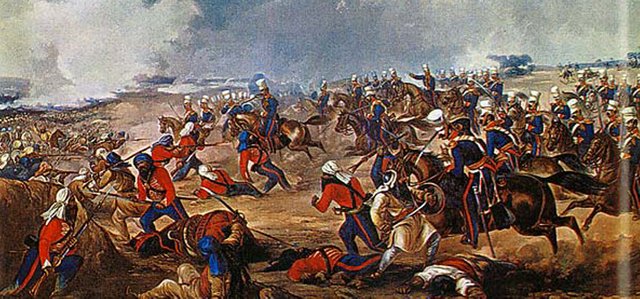Mir Madan: A general who fought to the death in the desert of Palashi
Palashi. In the history of the Indian subcontinent, this name is associated with betrayal, defeat, and subjugation. Although history is ashamed of the betrayal of Nawab Siraj's most loyal generals, he fought to the death of a number of patriotic, fearless generals. In the meantime, Mir Madan is a fighter with a unique status.
★Who was Mir Madan?
On 23rd June, 1757, the sun of Bengal's independence unexpectedly set in the Amrakan of Palashi. He fought to the death to keep that sun in dignity. Bakshi Mir Madan, one of the commanders of the battle of Palashi, fought for Nawab Siraj and his motherland in the village of Faridpur on the banks of Bhagirathi river in Murshidabad. At an important turning point in history, his role in the battle of Palashi was extremely courageous.
As far as is known, Mir Madan worked in Dhaka under Hasanuddin Khan. Hasanuddin Khan was the nephew of Hossain Quli Khan. Nawab Alivardi Khan himself liked Mir Madan for his loyalty and efficiency. Later Nawab Siraj brought him from Dhaka to Murshidabad and made him the commander-in-chief. He was given the title 'Bakshi'. From there he never broke the faith of the Nawab till his death in the battle of Palashi.

Source
*Mir Madan in the battle of Palashi
And the sun rose in the sky of Murshidabad on that day like ten normal days. But the sky became cloudy by noon. At the same time, the cloud of disaster appeared in the sky of independence of Bengal.
According to various sources in contemporary history, Lord Clive's forces left Calcutta in early June 1757 and captured Katwa Fort in the south on 16 June.The conspirators created such a situation that even though the Nawab had several army camps between Calcutta and Katwar, no one came forward to stop him. On 21 June Clive marched with his troops to Palashi, and on the way awaited the green message from Mir Jafar. As everyone knows, it was a disgusting and scandalous palace conspiracy to remove Nawab Siraj.
The greed for power of the traitors Jagatsheth Mahtab Chand, Mir Zafar, Umichand, Swarupchand, Yar Latif, Raydurlav and Ghaseti Begum was actively involved in this. With the covert help of Raja Rajballav, Maharaja Nandakumar, Raja Krishnachandra Roy, Rani Bhabani and others.
Let's go back to the desert of Palashi. The British forces led by Clive crossed the Hooghly River and set up camp in the desert of Palashi on 23 June. The British set up camp at a convenient location in Amrakan, Palashi. There was already a protected hunting ground of Nawab Siraj. The earthen embankment around the mango orchard called Lakshabagh gave additional facilities to the British forces.
At the battle of Palashi, the Nawab had a large force of 50,000 men. And the English had only three thousand soldiers. Weapons, ammunition, elephants, horses, the Nawab's forces were not far behind. But 40,000 of them were under Mir Zafar and the traitorous general Raydurlav, under Yar Latif. And on the battlefield they took a silent role.
Mir Madan took up position on the banks of the river Palashi. On one side was the French general Monsieur Sinfrey and on the other was the general Mohanlal. In all, there were less than a thousand soldiers under them. Apart from Mir Madan and Mohanlal, the few Nawabs who did not betray their country in that war were Bahadur Ali Khan, the commander of the gun forces, and Naye Singh Hazari, the commander of the artillery.
At the beginning of the war, Mir Madan cornered the British forces. But the English did not expect so much resistance. Clive is upset and asks Mir Zafar, why is there such resistance? Mir Zafar replied that their forces were not fighting, those who were fighting were the forces of Mir Madan and Mohanlal. Only if we can defeat them.
The war continues. Clouds froze in the sky by noon. It started raining heavily. The Nawab's forces failed to cover their artillery and ammunition even though the dreaded English forces covered their cannons and ammunition with tarpaulins. As a result, the ammunition of the Nawab's forces became ineffective in the rain. On the other hand, the cannons of the English are fully active.